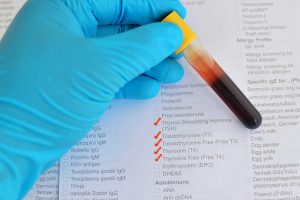 Hypothyroidism is linked to diabetic nephropathy in type 2 diabetes. The researchers measured serum thyroid hormone levels and urinary albumin:creatinine ratio in 414 patients with type 2 diabetes. Thirty-six of the patients had subclinical hypothyroidism (SCH), and prevalence of diabetic nephropathy was greater among those in the subclinical hypothyroidism group.
Hypothyroidism is linked to diabetic nephropathy in type 2 diabetes. The researchers measured serum thyroid hormone levels and urinary albumin:creatinine ratio in 414 patients with type 2 diabetes. Thirty-six of the patients had subclinical hypothyroidism (SCH), and prevalence of diabetic nephropathy was greater among those in the subclinical hypothyroidism group.
The authors concluded, “These findings imply that SCH may be a new therapeutic target to prevent the development and progression of renal disease in diabetes patients. Thyroid function screening should be offered to diabetes patients with diabetic nephropathy.”
Diabetic nephropathy (diabetic kidney disease) overview
Advertisement
Diabetic nephropathy means kidney disease in which diabetes is the cause of damage to the kidneys. High blood sugar over time can result in damage to the kidneys, as it causes them to overwork. As a result, they are unable to perform their job. When the kidneys stop working entirely, this is known as kidney failure.
Not all diabetics will experience diabetic nephropathy, and only some patients do actually develop the condition. It is still unknown as to why some patients are at risk while others are not. Some contributing factors to diabetic nephropathy are hypertension, high cholesterol, and smoking.
In early stages, symptoms are not present, which increases the risk for the condition to worsen without a patient’s knowledge. It’s important to go for regular urine tests to monitor the kidney function and to catch diabetic nephropathy early on before complications arise.
To test for diabetic nephropathy, doctors will look for albumin in the urine because urine doesn’t typically contain protein (which albumin is). Normally, if your kidneys are functioning, they will properly filter through waste and urine, so protein is not released. If your kidneys are malfunctioning, protein is then released, signaling a problem.
As damage to the kidneys worsens, patients will also notice an increase in blood pressure and cholesterol, so medications may be required in order to control these factors.
If you are diabetic, it’s important that you maintain healthy blood sugar levels as best as possible in order to avoid any diabetes-related complications.
Diabetic nephropathy symptoms
As mentioned, in its early stages, diabetic nephropathy does not present symptoms, but as the condition worsens symptoms will begin to arise. Some symptoms of diabetic nephropathy include:
- High levels of protein in the urine
- High blood pressure
- High cholesterol
- Swollen feet or legs
- Loss of appetite
- Weight loss
- Weakness
- Fatigue
- Nausea or vomiting
- Difficulty sleeping
As kidney function declines, blood sugar levels may also drop because the kidney cannot remove excess insulin. Be mindful of any changes to your health especially if you’re diabetic, as diabetes is associated with many other health complications as well.
Related Reading:
Hypothyroidism risk increases in chronic kidney disease patients with declining kidney function
Hypothyroidism risk increases in chronic kidney disease patients with declining kidney function. The study looked at a nationally representative cohort of 461,607 veterans with chronic kidney disease stages 3-5. The researchers found that each 10 mL/min/1.73 m2 lower estimated glomerular filtration rate (eGFR) was associated with an 18 percent increased risk of hypothyroidism in adjusted analyses. Continue reading…
Advertisement
Hypothyroidism (underactive thyroid) raises risk of type 2 diabetes
Hypothyroidism (underactive thyroid) raises the risk of type 2 diabetes, according to a new study. The findings revealed that the risk still remained even in those patients who had their hormone levels under control. Continue reading…
Sources:
http://www.renalandurologynews.com/news-in-brief/diabetic-nephropathy-linked-to-hypothyroidism/article/365399/
http://www.webmd.com/diabetes/tc/diabetic-nephropathy-topic-overview
